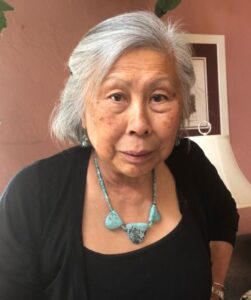by Jane Yee

May is Asian American and Pacific Islander (AAPI) Heritage Month, established by Congress to honor Asian and Pacific Americans who “have contributed significantly to the development of the arts, sciences, government, military, commerce, and education in the United States.”1 Congress chose May to commemorate the arrival of the first Japanese immigrants in May of 1843, as well as the role of Chinese immigrants in the completion of the transcontinental railroad in May of 1869. Since those times, Asian and Pacific Americans “have made countless significant contributions throughout the country’s history, [though] most have never made it into textbooks.”2 These contributions include innovations in medical treatments for HIV, labor organizations for agricultural, garment and domestic workers (United Farm Workers (UFW), International Ladies Garment Workers Union (ILGWU), and Domestic Workers United (DWU)), technology (Universal Serial Bus or USB), and social media (You-Tube).3
It makes sense that Congress enacted a law to fill in the gaps in our historical consciousness. But what is the risk that such “celebrations” amount to mere tokenism in a national landscape that is marred by racism and violence against AAPI? What can we do as active Democrats to rectify these contradictions? Awareness of and resistance against the social and economic injustices borne by others are always good starting places.
Violence against Asian Americans and Asian American Women:
Stop AAPI Hate reported almost 11,467 incidents of anti-AAPI behavior from March 2020 to March 2022; incidents in which “[a] large number … [included] anti-China rhetoric that blamed AAPI communities for the emerging COVID-19 pandemic.”4 FBI hate crime statistics show that anti-Asian hate crimes sharply increased by over 70% during the pandemic.5 Still, the majority of the incidents that Stop AAPI Hate compiled were not criminal in nature. Rather, they were “hate incidents” comprising harassment, avoidance or shunning, and civil rights violations such as workplace discrimination.6
Sixty-eight percent of the incidents reported by Stop AAPI Hate targeted women – possibly because women are viewed as “easier targets.”7 The most well-known cases were the horrific murders of six Asian American women in Atlanta in 2021 and two Asian American women in Albuquerque in 2022; these incidents involved women who worked in spas or massage parlors.8 As is generally the case, though, the majority of hate incidents do not involve crimes but rather reflect “everyday” racism and sexism experienced in the work, educational, social, and commercial environments. Asian American women are routinely treated according to stereotypical tropes such as the docile “butterfly” or the frightening “dragon lady”; but most frequently as simply invisible. Legal writer Oishi wrote about these stereotypes in her article, Where Sexism and Racism Meet: the Danger of Existing as an Asian American Woman; and I can testify to their implementation from my own experience.9
Both the horrific violence against Asian American women, as well as the more ordinary transgressions, are rooted in the legacy of systemic racism and sexism, and the accompanying violence. For example, Congress passed the Page Act in 1875 that prohibited the “importation of [Asian] women for the purposes of prostitution,” though this law effectively barred the immigration of all Asian women and promoted the myth that all Asian women are prostitutes.10 The United States military “has long allowed, encouraged, and promoted an active sex industry for American soldiers abroad.”11
What Can We Do?
The environmental justice movement has developed an effective organizing tool, “meaningful consultation,” that would help in ending racism and violence against Asian Americans. In the latter context, meaningful consultation would mean reaching out to Asian and Pacific Americans in our communities to learn about their experiences, including the injustices that they regularly endure and what the effective solutions might be. Stop AAPI Hate recommends educational equity, community-driven safety solutions, and civil rights expansion.
Working in the Democratic Party, we all have opportunities to collaborate with Asians and Pacific Islanders who live in our own neighborhoods, as well as in our city and state. We have the opportunity to facilitate meaningful consultations. We have the opportunity to empower and give voice to the historically “invisible” people in our communities. We have the opportunity to link arms to demand public policies that will result in genuine social and economic justice.
1 Public Law 102-450, 102d Congress, October 23, 1992; see also U.S. Census Bureau Releases Key Stats in Honor of 2023 Asian American, Native Hawaiian, and Pacific Islander Heritage Month, May 1, 2023, including the estimated number of 24 million Asians who were residents of the United States in 2021, at https://www.commerce.gov/news/blog/2023/05/us-census-bureau-releases-key-stats-honor-2023-asian-american-native-hawaiian-and.
2 8 Groundbreaking Contributions by Asian Americans Through History, March 31, 2021, https://www.history.com/news/asian-american-inventions-contributions; see also https://aflcio.org/2018/5/3/7-labor-activists-you-should-know-about-asian-pacific-american-heritage-month
3 Id
4 Stop AAPI Hate, Two Years and Thousands of Voices: What Community Generated Data Tells Us about Anti-AAPI Hate, July 2022), pp. 3-4.
5 Depts. Of Justice and Health and Human Services, Raising Awareness of Hate Crimes and Hate Incidents During the COVID-19 Pandemic, p. 10.
6 Two Years and Thousands of Voices, pp. 3-4.
7 See e.g. Nicole Chung, Violence Against Asian American Women is Rotted in More than Just ‘Hate’, Atlantic, March 17, 2022.
8 https://asamnews.com/2022/02/16/gun-violence-violent-crime-asian-spas-albuquerque-police-department/
9 Where Sexism and Racism Meet: the Danger of Existing as an Asian American Woman, at notes 40-49.
10 Oishi, Where Sexism and Racism Meet: the Danger of Existing as an Asian American Woman, Georgetown Law Review, XXIII, Issue 2, 2022, at note 9.
11 Id at note 29; see also recent NY Times article, Amanda Traub, A South Korean Horror Story, Long Suppressed, May 2023.
